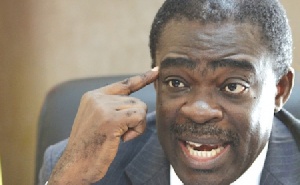 Rev. Dr. Kwabena Opuni-Frimpong
Rev. Dr. Kwabena Opuni-Frimpong
The Christian Council of Ghana(CCG) says Minority Chief Whip, Mohammed Mubarak Muntaka’s stance on government’s decision to hand over mission schools in the country to their founding churches is problematic.
The Council said it disagrees with the assertions by the Asawase lawmaker suggesting that giving more controls to the Missions has the tendency of making them centres of indoctrination.
Alhaji Mohammed Mubarak Muntaka had threatened to drag government to the Supreme Court, should it proceed to hand over mission schools to their founding Churches.
“Is he talking about handing over national assets to some groups? he should say that so that some of us to be clear because if he says control, I think they have control. Go round the mission school, the Islamic School, T.I Am you need to be one of them to be headmaster. Because, look we have a little over 800 SHSs in Ghana, 575 of them as of the missions. I believe there may be even constitutional issues that many of us will be interested in testing this at the Supreme Court because you just can’t sit and say you’re handing over the national asset to one group.”
Reacting to the Legislator’s opposing stance on the move, the General Secretary of the CCG, Rev. Dr. Kwabena Opuni–Frimpong said “nobody should consider this as a takeover” insisting the schools belong to them, and that government’s stake in it is primarily to lend support to them.
“This idea of indoctrination-If you check the history of education in Ghana, especially mission schools, the history doesn’t sustain the fear and the debate on the fact that mission schools or Churches will use their schools to indoctrinate children who studied in their schools.
That has not been the track record. We have great Muslim scholars in this country who have studied in Mission schools and they are still wonderful Muslims. We have Muslims working in Christian Hospitals.
My office here, Christian Council of Ghana, I have Muslims working with us ad they feel comfortable. On Friday they ask permission to go for Prayer. That is how we have lived in this country-Our schools are very inclusive.” he told Accra-based Citi FM.